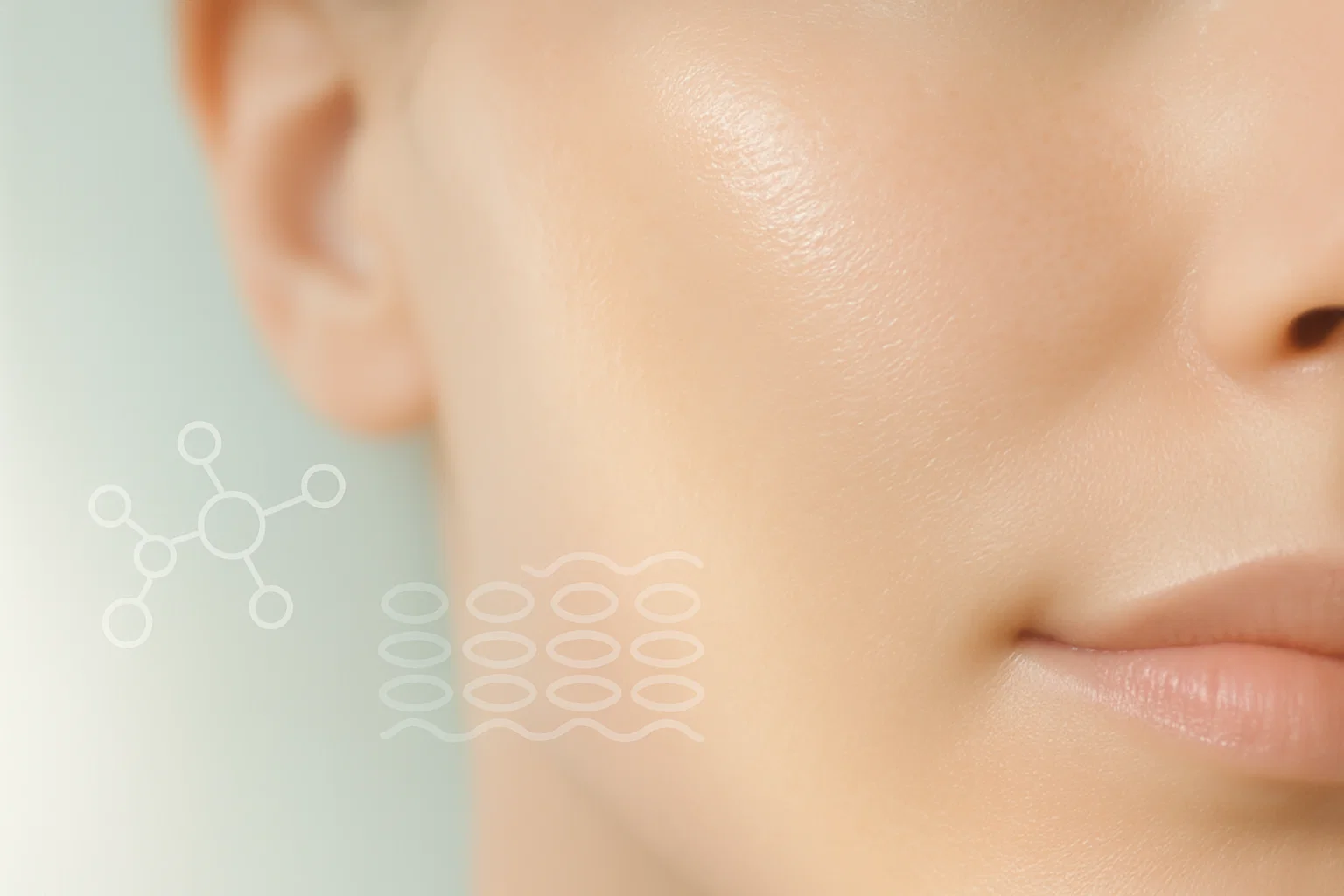
What Is the Skin Barrier?
The outermost layer of your skin, called the stratum corneum, acts as the barrier between your body and the environment. It’s composed of tough skin cells (corneocytes) held together by lipids such as ceramides, cholesterol, and fatty acids — often compared to a “brick and mortar” structure.
- Bricks: The skin cells that provide structure.
- Mortar: The lipids that seal gaps and prevent moisture loss.
When this structure is balanced, your skin stays smooth, hydrated, and resilient. When damaged, it can lead to dryness, irritation, breakouts, and sensitivity.
Why the Skin Barrier Matters
Your skin barrier isn’t just about aesthetics — it’s a biological shield essential for your overall health.
- Prevents Water Loss: A strong barrier keeps your skin hydrated by locking in moisture.
- Blocks Irritants: It protects against pollutants, bacteria, and allergens.
- Regulates Sensitivity: A healthy barrier reduces inflammation and helps manage conditions like eczema or acne.
- Supports Skin Repair: It aids in the recovery of damaged skin and maintains elasticity.
A compromised barrier can manifest as redness, flakiness, tightness, or burning sensations — all signs your skin is struggling to defend itself.
Common Causes of Skin Barrier Damage
Even everyday habits can weaken your skin barrier. Here are the most frequent culprits:
1. Over-Cleansing and Over-Exfoliating
Washing your face too often or using abrasive scrubs can strip away natural oils and disturb pH balance, leaving the skin dry and vulnerable.
2. Harsh Skincare Ingredients
Products containing alcohol, sulfates, or strong acids can erode protective lipids and cause irritation.
3. Environmental Stress
Exposure to pollution, UV rays, and extreme weather leads to oxidative stress, accelerating skin barrier breakdown.
4. Poor Lifestyle Choices
Lack of sleep, dehydration, stress, and unhealthy diet choices also impact your skin’s ability to heal and regenerate.
5. Medical Conditions
Skin disorders like eczema, psoriasis, and rosacea are often linked to impaired barrier function, requiring professional care and treatment.
How to Protect Your Skin Barrier
1. Simplify Your Skincare Routine
Stick to a gentle cleanser, a fragrance-free moisturizer, and sunscreen. Avoid layering too many active ingredients that could interact negatively.
2. Choose Barrier-Friendly Ingredients
Look for skincare containing:
- Ceramides: Restore lipids and strengthen the skin’s natural shield.
- Hyaluronic Acid: Deeply hydrates and plumps the skin.
- Niacinamide: Reduces redness and improves elasticity.
- Panthenol & Squalane: Soothes irritation and promotes healing.
3. Maintain Optimal Hydration
Drink enough water and use moisturizers that help lock it in. Hydration plays a major role in keeping the skin supple and barrier intact.
4. Use Sunscreen Daily
UV damage is one of the biggest threats to barrier health. Apply broad-spectrum SPF 30 or higher, even on cloudy days.
5. Avoid Overuse of Actives
While ingredients like retinol and AHAs are beneficial, excessive use can damage the protective layer. Introduce them gradually and under dermatologist guidance.
6. Protect Against Pollution
Use antioxidant-rich serums (Vitamin C, E) and gentle cleansers to combat environmental damage and restore the skin’s defense.
Dermatologist-Approved Treatments for Barrier Repair
When at-home care isn’t enough, professional treatments can help rejuvenate and strengthen the skin barrier effectively:
- HydraFacial Therapy: Deeply cleanses and rehydrates the skin without irritation.
- Chemical Peels: When performed under supervision, mild peels remove damaged cells and promote barrier renewal.
- LED Light Therapy: Stimulates collagen and reduces inflammation.
- Barrier-Repair Facials: Tailored treatments that use calming, lipid-rich serums for sensitive skin.
Explore barrier-repair solutions like the HydraFacial Treatment and Chemical Peel Procedure offered by Dermacian experts to restore skin balance safely.
Simple Daily Habits to Support Your Skin Barrier
- Limit hot showers — lukewarm water is gentler.
- Apply moisturizer immediately after washing your face.
- Get 7–8 hours of sleep for natural skin regeneration.
- Eat foods rich in omega-3s, vitamins C and E.
- Avoid touching your face frequently.
Consistency is key. Even small lifestyle improvements can significantly enhance barrier strength over time.
Conclusion: A Healthy Barrier Is Healthy Skin
Your skin barrier is the foundation of all skincare. When it’s functioning properly, every product and treatment you use works better — resulting in smoother, brighter, and stronger skin. Protecting this barrier is less about perfection and more about balance: hydration, gentle care, and professional guidance.
To learn more about restoring and maintaining healthy skin, visit Dermacian’s Skincare Solutions — where science meets expertise in every treatment.